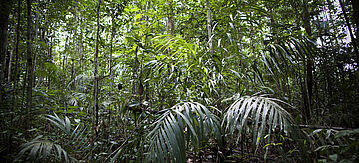International forest conservation

The state of the world’s forests continues to be a source of concern. According to the FAO’s Global Forest Resources Assessment 2020, the annual rate of global forest loss amounts to ten million hectares (primeval forests accounting for about a third of that). Most deforestation and forest degradation takes place in the tropics and sub-tropics, but there is also significant forest loss in boreal regions (Russia, Canada). Destruction and deforestation of primeval forests is leading to an irreversible loss of species. Around 70 percent of all species live in what are known as mega-diverse countries in the tropics and subtropics, and primarily in species-rich tropical forests. Tropical forests are of special importance for maintaining atmospheric circulation at regional as well as global level. They also provide essential water and ecosystem services such as protecting the soil and capturing and storing CO2 from the atmosphere.
The Federal Environment Ministry supports countries in protecting, conserving, sustainably managing and restoring forests through its International Climate Initiative (ICI). Projects build on ideas arising from decisions taken in the framework of the Convention on Biological Diversity (CBD) and the UN Framework Convention on Climate Change (UNFCCC) and aim at better interlinking biodiversity conservation and climate action. They also contribute substantially to the implementation of the sustainable development goals and the UN Decade for the restoration of ecosystems and other important international initiatives.
